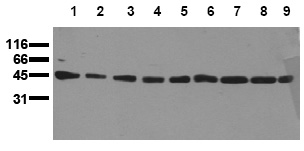MEK1 (MAP2K1) (incl. pos. control) Mouse Monoclonal Antibody [Clone ID: 9G3]
CAT#: AM00091PU-N
MEK1 (MAP2K1) (incl. pos. control) mouse monoclonal antibody, clone 9G3, Purified
Other products for "MEK1"
Specifications
| Product Data | |
| Clone Name | 9G3 |
| Applications | ELISA, WB |
| Recommended Dilution | Western Blot: 0.5 µg/ml for HRPO/ECL detection. Included Positive Control: Cell lysate from untreated HepG2 cells. (See Protocols) Recommended blocking buffer: Casein/Tween 20 based blocking and blot incubation buffer. ELISA: 0.1 µg/ml (protein ELISA). |
| Reactivities | Canine, Human, Mouse, Rat |
| Host | Mouse |
| Isotype | IgG2a |
| Clonality | Monoclonal |
| Immunogen | Synthetic peptide conjugated to KLH |
| Specificity | This antibody specifically recognizes the activation loop of MEK1/2 independent of its phosphorylation status. |
| Formulation | 1 ml PBS / 0.09 % Na-azide / PEG and Sucrose State: Purified State: Lyophilized purified Ig |
| Reconstitution Method | Restore with 1 ml H2O (15 min, RT) |
| Purification | Size exclusion chromatography |
| Conjugation | Unconjugated |
| Storage | Store lyophilized at 2-8°C for 6 months or at -20°C long term. After reconstitution store the antibody undiluted at 2-8°C for one month or (in aliquots) at -20°C long term. Avoid repeated freezing and thawing. |
| Stability | Shelf life: one year from despatch. |
| Gene Name | mitogen-activated protein kinase kinase 1 |
| Database Link | |
| Background | MEK (MAP Kinase Kinase) phosphorylates the MAP Kinase on both threonine and tyrosine residues of the activation motif TEY. MEK1 and MEK2 are activated by phosphorylation of two serine residues (Ser 218/222 in MEK1 and Ser 222/226 in MEK2). These phosphorylation sites are substrates of the Raf family of kinases. |
| Synonyms | MAP2K1 - mitogen-activated protein kinase kinase 1, MAPKK1, MEK1, MKK1, PRKMK1, MAP2K2 - mitogen-activated protein kinase kinase 2, MAPKK2, MEK2, MKK2, PRKMK2 |
| Note | Protocol: Positive Control: Cell lysate from untreated HepG2 cells Formulation: Lyophilized cell lysate from serum starved HepG2 cells Reconstitution: Reconstitute by addition of 200 μl H2O. After complete solubilization add 200 μl 2x SDS-PAGE sample buffer, mix and incubate at 90 °C for 5 min. Aliquote and store frozen. Avoid repeated freeze/thaw cycles. Application: The positive control cell lysate is recommended for immunoblot applications. 20 μl of positive control cell lysate correspond to ca. 80.000 cells. Use 20 μl/lane (mini gel) for HRPO/ECL detection of the target proteins. Please note: The lyophilized cell lysates contain SDS and are not recommended for applications with native proteins such as immunoprecipitation. |
| Reference Data | |
| Protein Families | Druggable Genome, Protein Kinase |
| Protein Pathways | Acute myeloid leukemia, B cell receptor signaling pathway, Bladder cancer, Chemokine signaling pathway, Chronic myeloid leukemia, Colorectal cancer, Dorso-ventral axis formation, Endometrial cancer, ErbB signaling pathway, Fc epsilon RI signaling pathway, Fc gamma R-mediated phagocytosis, Focal adhesion, Gap junction, Glioma, GnRH signaling pathway, Insulin signaling pathway, Long-term depression, Long-term potentiation, MAPK signaling pathway, Melanogenesis, Melanoma, Natural killer cell mediated cytotoxicity, Neurotrophin signaling pathway, Non-small cell lung cancer, Oocyte meiosis, Pancreatic cancer, Pathways in cancer, Prion diseases, Progesterone-mediated oocyte maturation, Prostate cancer, Regulation of actin cytoskeleton, Renal cell carcinoma, T cell receptor signaling pathway, Thyroid cancer, Toll-like receptor signaling pathway, Vascular smooth muscle contraction, VEGF signaling pathway |
Documents
| Product Manuals |
| FAQs |
| SDS |
{0} Product Review(s)
0 Product Review(s)
Submit review
Be the first one to submit a review
Product Citations
*Delivery time may vary from web posted schedule. Occasional delays may occur due to unforeseen
complexities in the preparation of your product. International customers may expect an additional 1-2 weeks
in shipping.






























































































































































































































































 Germany
Germany
 Japan
Japan
 United Kingdom
United Kingdom
 China
China



